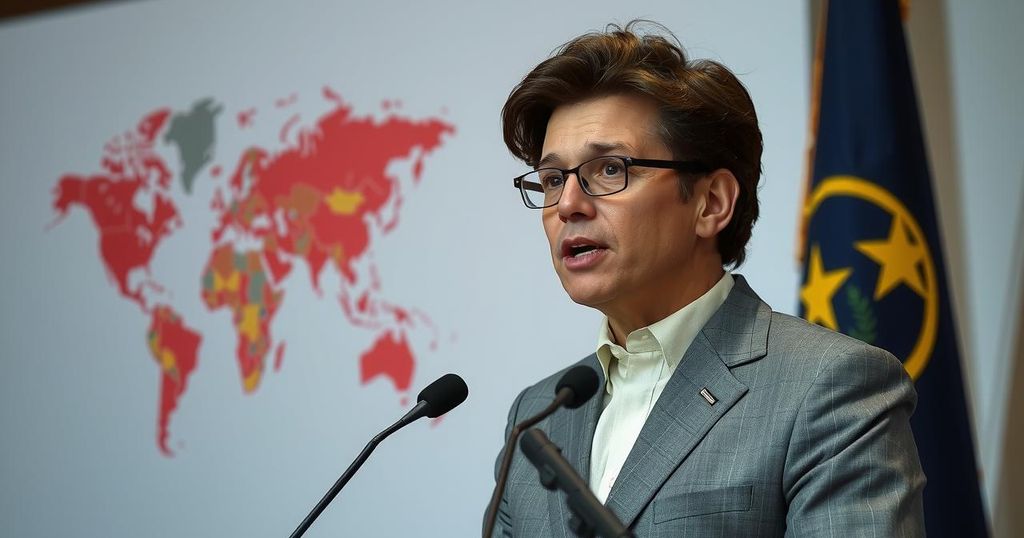Iran Discusses Snapback Mechanism, Egypt Relations, and FATF Compliance
Iran’s government spokesperson, Fatemeh Mohajerani, addressed the potential activation of the snapback mechanism amid ongoing diplomatic efforts; she expressed hope for rational decision-making by Western nations. Discussing an upcoming presidential visit to Egypt, she emphasized strengthening economic and diplomatic ties. Additionally, several domestic initiatives, including coastal development and prospects for FATF approval, were highlighted, showcasing Iran’s commitment to dialogue and economic growth.
TEHRAN – Fatemeh Mohajerani, spokesperson for the Iranian government, addressed the current concerns regarding the activation of the snapback mechanism during a cabinet meeting held in Tehran on Wednesday. She expressed hope that Western nations would adopt more rational decision-making approaches to facilitate the resolution of issues through diplomatic channels, a task actively pursued by the Ministry of Foreign Affairs.
In her remarks, Mohajerani reaffirmed the Iranian commitment to dialogue, stating, “We have consistently emphasized our commitment to resolving matters through negotiation,” adding that the nation “remains open to dialogue and strives diligently to achieve it.” This dialogue is crucial as the snapback mechanism, established in the 2015 Joint Comprehensive Plan of Action (JCPOA) between Iran and the P5+1, allows for the reimposition of UN sanctions based on claims of noncompliance, which Iran often contests as politically motivated.
Further discussing Iran’s upcoming presidential visit to Egypt, accompanied by Foreign and Economy Ministers, Mohajerani remarked, “Egypt is a nation where, through sustained diplomatic efforts across various administrations, including the current government, we have observed some progress.” She emphasized that the purpose of this visit is to enhance economic ties and foster diverse diplomatic activities between Iran and Egypt, guided by the president and the foreign minister.
Additionally, Mohajerani provided updates on economic and domestic policy developments, revealing several initiatives approved during the cabinet session, including an amendment to the Makran Coast Development Council’s charter, in line with Ayatollah Seyed Ali Khamenei’s directive for sea-centric development. She stated, “Our country’s coastline, particularly the Makran coast, is a significant asset and can serve as a major economic driver for us.”
The amendment aims to promote economic opportunities by advancing Iran’s coastal regions, which play a critical role in the nation’s strategic economic plans. The Makran coastal region spans across the Balochistan province in Pakistan and extends along the coast of the Gulf of Oman in Iran.
Moreover, responding to questions about favorable signals from Iran’s Expediency Discernment Council regarding the approval of the Financial Action Task Force (FATF), Mohajerani indicated, “On matters concerning our national interests, I trust that all stakeholders will work towards resolving the country’s challenges.” She expressed optimism about the FATF approval prospects, asserting that the environment appears conducive for progress on all fronts.
The FATF serves as a global organization dedicated to establishing criteria for countering money laundering and terrorism financing, and the discussion regarding Iran’s potential alignment with these regulations continues to generate considerable debate among its officials.
The discussion of the snapback mechanism relates to provisions within the Joint Comprehensive Plan of Action (JCPOA) signed in 2015, which has been subject to intense scrutiny and political disagreement. This mechanism permits the reinstatement of UN sanctions against Iran if it is found non-compliant, a claim often challenged by the Iranian government as being politically motivated. The Iranian government’s diplomatic efforts towards Egypt showcase its desire to strengthen economic ties and diplomatic relations in the region. In addition, Iran’s domestic economic policy, particularly in the development of the Makran coastline, reflects its strategic focus on utilizing coastal resources to enhance economic growth. Moreover, the ongoing discussions regarding compliance with the FATF regulations indicate the intricate relationship between Iran’s economic policy and international financial standards, impacting its global trade and relations.
In summary, Iranian government spokesperson Fatemeh Mohajerani articulated the government’s diplomatic strategies to address the snapback mechanism concerns, reinforce relations with Egypt, and stimulate domestic economic development in the Makran region. She underscored Iran’s commitment to dialogue while expressing optimism about progress regarding FATF compliance. The statements made reflect Iran’s approach to navigating complex international dynamics and its focus on building robust economic frameworks.
Original Source: www.tehrantimes.com




Post Comment